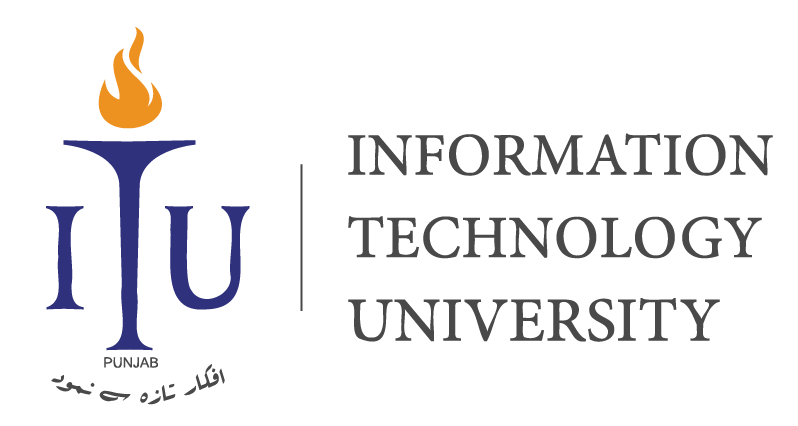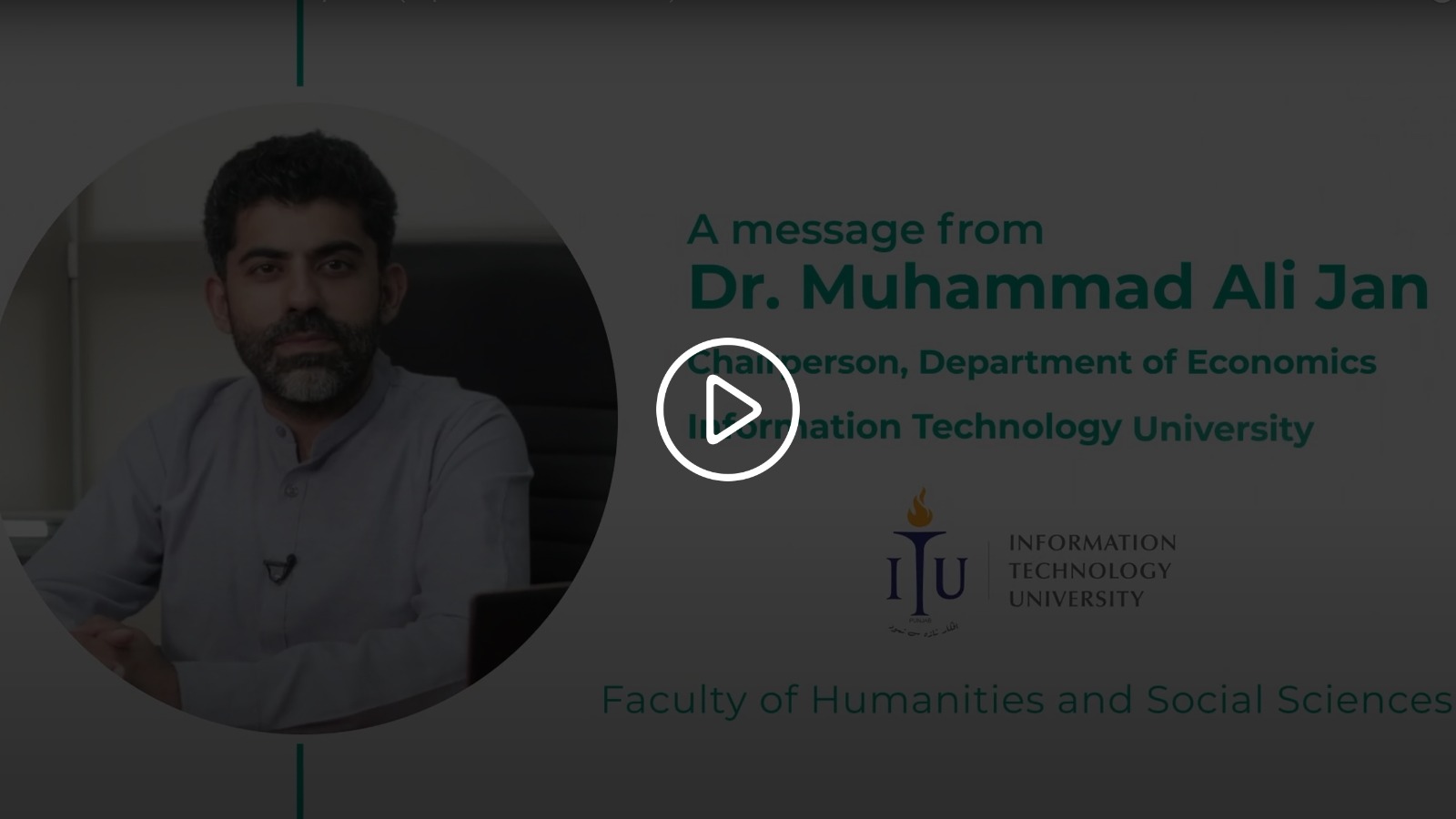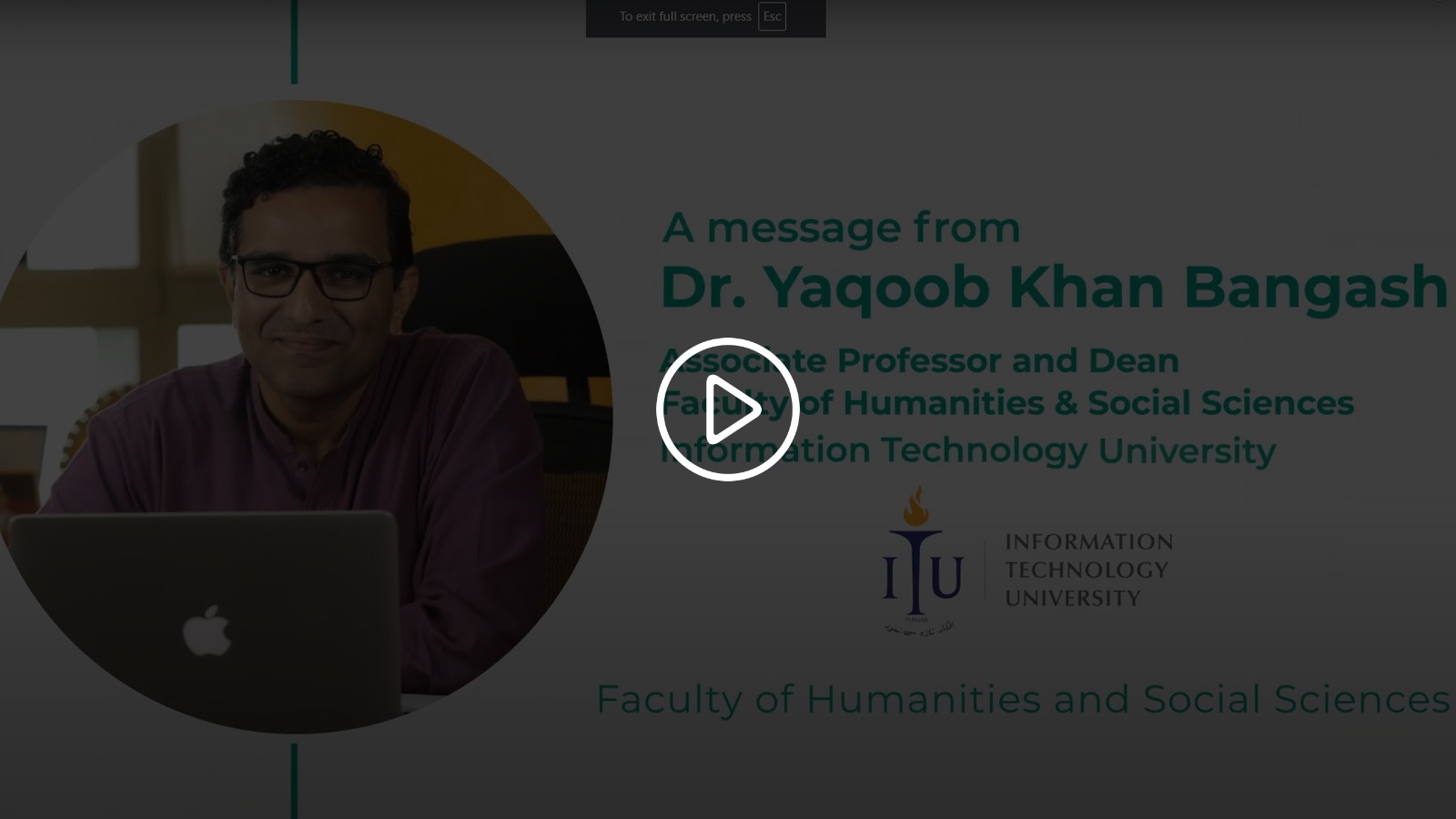Why you should study BS Economics with Data Science at ITU?
Introduction to the Program
The Science of Economics today is in a crisis. This is because mainstream economics, as it has been taught over the last century, has failed to adequately address so far some of the principal challenges faced by the human community at the global and national levels: recurrent economic crises, growing inequality, widespread violence and the environmental crisis that has placed our planet in peril. As Thomas Kuhn has pointed out, science progresses through paradigm changes. When new questions emerge, which the prevailing paradigm is unable to investigate, and then a new paradigm emerges. This is why the leading universities in the world are engaged in rethinking economics, crossing its conventional boundaries and bringing teachers and students together in the great endeavor of developing a new paradigm for the subject.
In this historic juncture, the aim of an undergraduate programme in Economics should be to combine rigorous training in mainstream economics with data science together with exposure to a wide range of fields in the Social Sciences and Humanities. Through such multidisciplinary training around hardcore economics, the students can be stimulated to form connections across subjects in addressing the central challenges that impact society, economy and polity. Students of economics can thereby participate in the exciting venture of transforming the economics paradigm and help build a better future for the human community.
The undergraduate programme in economics with data science has been designed with this aim in view. Rigorous training is provided in economics through courses such as Macroeconomics, Microeconomics, Mathematics, Econometrics, International Trade and Finance. Emerging fields in economics are also included in the programme. For example, the New Political Economy, Sustainable Development, Evidence Based design of Policy for Urban and Rural Development. A key dimension in the economics programme is Data Science which has two components: (i) Big Data Techniques and (ii) Machine Learning. This relatively new field is becoming increasingly important in the design of projects and policies. This corpus of courses in economics and data science is combined with courses in the fields of Philosophy, Politics and Literature.
It is hoped that systematic training in economics and data science, combined with a broad understanding of Social Sciences and Humanities, will equip students to contribute to research and policy thinking. They will thus be able to participate in the process of developing a new paradigm in economics and building a better world.
Eligibility Criteria
Who can apply?
Applicants who have completed 12 years of education, or will do so in the 2024 session.
- Scored 40% marks or above in Matriculation or equivalent examination
AND - Scored 40% marks or above in Intermediate or equivalent examination*
- Minimum score for eligibility is 40% in the ITU Admissions Test
OR
To be exempted from the ITU Admissions Test:
SAT I with at least 550 score in each section: Math and EBRW (Verbal)
OR
USAT (all types) test with minimum required score 50%
OR
NTS (all types) test with minimum required score 50%
Details*
- Successfully cleared 3 subjects in A’ Levels
- A GPA of at least C in American High School Diploma
- Scored at least 24 out of 45 points in International Baccalaureate
General Notes
Note: Per HEC rules, candidates who have completed 12 years of education and obtained degrees other than Matriculation (SSC) or Intermediate (HSSC) may be required to obtain an equivalence certificate from the Inter Board Committee of Chairman (IBCC), Islamabad.
AS Level and General Studies are not accepted
Admission Test
Applicants can take the ITU Admission Test, SAT, USAT, OR NTS for admission to ITU.
The ITU Admission Test will be held at the ITU campus in Arfa Software Technology Park in Lahore.
The test will be 90 mins. long and will comprise mostly of Multiple-Choice Questions. A minimum score of 50% is required.
For information about dates please click here here.
Entry Test Pattern
Sample Test
Applicants who have taken the SAT (through Collegeboard USA) during the last two years, can be exempted from the ITU Admissions Test. SAT scores can be reported to ITU officially from the testing agency. The college code for reporting SAT scores to ITU is 7537. Please refer to the Collegeboard website for details about the SAT test and score report delivery.
You must have to upload the result card and payment proof after declaration of result on ITU admission portal.
| Discipline | Required SAT Test | Minimum Score |
| BS-Economics with Data Science | SAT I – Verbal | 550 |
| SAT I – Math | 550 |
For information about dates please click here.
Validity: July 2022 – June 2024
Applicants who have taken the USAT USAT (all types) test with minimum required score 50% during the last one year, can be exempted from the ITU .
You must have to upload the result card after declaration of result on ITU admission portal.
Validity: July 2023 – June 2024
For information about dates please click here.
Applicants who have taken NTS (all types) test with minimum required score 50% during the last one year, can be exempted from the ITU Admissions Test.
You must have to upload the result card after declaration of result on ITU admission portal.
Validity: July 2023 – June 2024
For information about dates please click here.
Fee Structure
New Intake 2025
| Semesters | Tuition Fee | University Dues | Semester Wise Total Fee |
| First Semester | 157,000 | 45,000 | 202,000 |
| Second Semester | 157,000 | 38,250 | 195,250 |
| Third Semester | 164,000 | 40,000 | 204,000 |
| Fourth Semester | 164,000 | 40,000 | 204,000 |
| Fifth Semester | 173,000 | 42,000 | 215,000 |
| Sixth Semester | 173,000 | 42,000 | 215,000 |
| Seventh Semester | 181,000 | 44,000 | 225,000 |
| Eight Semester | 181,000 | 44,000 | 225,000 |
| Total Degree Fee | 1,350,000 | 335,250 | 1,685,250 |
- A lump sum tuition fee will be charged for the semester as per the total required credit hours according to the approved roadmap/program structure of the respective degree program.
- The fee for a summer semester, course repeat/improvement will be charged Rs.9,200/per credit hour.
Total Annual Cost Per Student (Approx.)
Cost Per Student (2024-2025) in PKR |
|
| Total Annual Cost Per Student (Approx) | 6,27,500 |
|---|---|
| Subsidy from Provincial Government | 73,750 |
| Subsidy from Federal Government | 83,125 |
| Subsidy from ITU Endowment & investment incomes | 1,73,750 |
| Average Per Student Fees Contribution | 2,96,875 |
For BS Batches (2023, 2024)
| Semesters | Tuition Fee | Other Dues | Semester Wise Total Fee |
| Fall-2025 | 157,000 | 38,250 | 195,250 |
| Spring-2026 | 157,000 | 38,250 | 195,250 |
| Fall-2026 | 164,000 | 40,000 | 204,000 |
| Spring-2027 | 164,000 | 40,000 | 204,000 |
| Fall-2027 | 173,00 | 42,000 | 215,000 |
| Spring-2028 | 173,000 | 42,000 | 215,000 |
| 988,000 | 240,500 | 1,228,500 |
- A lump sum tuition fee will be charged for the semester as per the total required credit hours according to the approved roadmap/program structure of the respective degree
- The fee for a summer semester, course repeat/improvement will be charged For BS Programs: Rs.9,200/per credit hour.
For BS Batch 2022
| Semesters | Tuition Fee | Other Dues | Semester Wise Total Fee |
| Fall-2025 | 137,000 | 35,500 | 172,500 |
| Spring-2026 | 137,000 | 35,500 | 172,500 |
| 274,000 | 71,000 | 345,000 |
- A lump sum tuition fee will be charged for the semester as per the total required credit hours according to the approved roadmap/program structure of the respective degree
- The fee for a summer semester, course repeat/improvement will be charged For BS Programs: Rs.8,000/per credit hour.
Fee for International Students
| Particular | Fee for the International Students |
| Admission Fee | 50$ |
| University Dues (Per Semester) | 200$ |
- A 5% annual increment has been implemented on all dues.
- Revised approved fee structure will be implemented from Fall-2025 session.
Program Structure
Scheme of Studies for Eight Semesters
| Course Title | Course Code | Credits |
| Semester I | ||
| Expository Writing/Introduction to Writing 1 | WR101 | 4 |
| Introduction to Economics | ECON100 | 4 |
| Introduction to Programming | ECON112 | 4 |
| Pre-Calculus/Basic Mathematics | MATH100 | 4 |
| Semester’s Total Credits | 16 | |
| Course Title | Course Code | Credits |
| Semester II | ||
| Expository Writing/Introduction to Writing 2 | WR102 | 4 |
| Introduction to Political Science/Social Science Elective | ECON109 | 4 |
| World History | SSH109 | 4 |
| Pakistan and Modern South Asia | SSH111 | 4 |
| Semester’s Total Credits | 16 | |
| Course Title | Course Code | Credits |
| Semester III | ||
| Islamic History/Islamic Studies | HU 103 | 4 |
| World Literatures/Humanities Elective | ECON201 | 4 |
| Introduction to Philosophy/Humanities Elective | ECON203 | 4 |
| Principles of Microeconomics | ECON220 | 4 |
| Semester’s Total Credits | 16 | |
| Course Title | Course Code | Credits |
| Semester IV | ||
| Expository Writing 3/Introduction to Academic Writing | WR103/HU 104 | 4 |
| Introduction to Sociology/Social Science Elective | SSH100 | 4 |
| Principles of Macroeconomics | ECON 221 | 4 |
| Calculus 1 | ECON 231 | 4 |
| Semester’s Total Credits | 16 | |
| Course Title | Course Code | Credits |
| Semester V | ||
| Intermediate Microeconomics | ECON301 | 4 |
| Calculus II | ECON312 | 4 |
| Statistics and Probability | ECON313 | 4 |
| Data Structures | ECON341 | 4 |
| Semester’s Total Credits | 16 | |
| Course Title | Course Code | Credits |
| Semester VI | ||
| Intermediate Macroeconomics | ECON311 | 4 |
| Mathematical Economics | ECON351 | 4 |
| Econometrics | ECON361 | 4 |
| Databases | ECON371 | 4 |
| Semester’s Total Credits | 16 | |
| Course Title | Course Code | Credits |
| Semester VII | ||
| Research Methods | ECON381 | 4 |
| Thesis I/Advanced Microeconomics | ECON301 | 4 |
| History of Economic Thought | ECON425 | 4 |
| Data Mining | ECON392 | 4 |
| Semester’s Total Credits | 16 | |
| Course Title | Course Code | Credits |
| Semester VIII | ||
| Public Finance | ECON313 | 4 |
| Thesis 2/Advanced Macroeconomics | ECON311 | 4 |
| Development Economics | ECON361 | 4 |
| International Political Economy | ECON314 | 4 |
| Semester’s Total Credits | 16 | |
Note:
Please note that this is a tentative roadmap/scheme of study. There can be slight changes to the exact courses being offered, especially with regard to electives.
The overall course offerings for the program will be guided by the following degree structure:
Proposed BS EDS 4-year degree requirements:
| Total Number of Courses | General Education (13) | |
| 1 | 1 | Expository Writing 1 |
| 2 | 2 | Expository Writing 2 |
| 3 | 3 | Expository Writing 3 |
| 4 | 4 | Intro to Philosophy/Elective |
| 5 | 5 | World History/Elective |
| 6 | 6 | Intro to Sociology/Elective |
| 7 | 7 | Intro to Political Science/Elective |
| 8 | 8 | Pakistan Studies/History of South Asia and Pakistan |
| 9 | 9 | Islamic Studies/ Religious Studies |
| 10 | 10 | Natural Science Elective |
| 11 | 11 | Natural Science Elective |
| 12 | 12 | Pre- Calculus |
| 13 | 13 | Introduction to Programming |
| Economics Core Courses (7) | ||
| 14 | 1 | Statistics and Probability |
| 15 | 2 | Principles of Microeconomics |
| 16 | 3 | Principles of Macroeconomics |
| 17 | 4 | Intermediate Microeconomics |
| 18 | 5 | Intermediate Macroeconomics |
| 19 | 6 | Mathematical Economics |
| 20 | 7 | Econometrics |
| Required Higher Level Economics Electives (5: Examples) | ||
| 21 | 1 | Issues in Pakistan Economy |
| 22 | 2 | Foundations of Political Economy I & II |
| 23 | 3 | History of Economic Thought I & II/Economic History |
| 24 | 4 | Advanced Micro/Thesis I/Time Series Econometrics |
| 25 | 5 | Advanced Macro/Thesis II /Development Economics |
| Distributional Requirements (7: from allied fields/subjects) | ||
| 26 | 1 | Research Methods |
| 27 | 2 | Data Structure |
| 28 | 3 | Data Bases |
| 29 | 4 | Data Mining |
| 30 | 5 | Calculus 1 |
| 31 | 6 | Calculus 2/Introduction to Computational Statistics/Statistics II |
| 32 | 7 | Elective |



